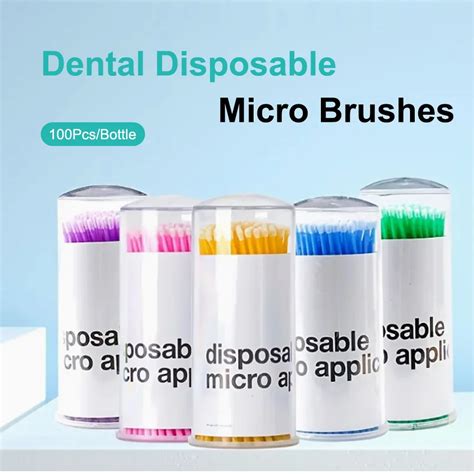Dental care is an essential aspect of our overall health and wellbeing. With the advancements in dental technology and products, maintaining good oral hygiene has become more accessible and convenient. One such tool that has proven to be highly beneficial in dental care is the applicator brush. An applicator brush is a small, handheld brush used to apply various dental materials, such as fluoride, sealants, and whitening agents, directly onto the teeth. In this article, we will explore the five uses of an applicator brush in dental care.
The Importance of Oral Hygiene
Before we dive into the uses of an applicator brush, it's essential to understand the importance of oral hygiene. Good oral hygiene practices, such as brushing and flossing, help remove plaque and bacteria from the teeth, preventing issues like tooth decay, gum disease, and bad breath. However, sometimes, these practices may not be enough, and that's where an applicator brush comes in.
Use 1: Fluoride Application
One of the most common uses of an applicator brush is to apply fluoride to the teeth. Fluoride is a mineral that helps strengthen tooth enamel, making teeth more resistant to decay and sensitivity. An applicator brush allows dentists or hygienists to apply a fluoride gel or varnish directly onto the teeth, ensuring that the teeth receive the optimal amount of fluoride.

Use 2: Dental Sealant Application
Another use of an applicator brush is to apply dental sealants to the teeth. Dental sealants are clear or tooth-colored materials that are applied to the chewing surfaces of the teeth to prevent decay. An applicator brush helps to apply the sealant material precisely, ensuring that the teeth are fully protected.

Use 3: Teeth Whitening
Applicator brushes can also be used to apply teeth whitening agents to the teeth. Teeth whitening is a popular cosmetic dental procedure that helps to remove stains and discoloration from the teeth. An applicator brush allows for precise application of the whitening agent, ensuring that the teeth are evenly whitened.

Use 4: Desensitizing Agents
Applicator brushes can also be used to apply desensitizing agents to sensitive teeth. Desensitizing agents help to block the dentinal tubules in the teeth, reducing sensitivity and discomfort. An applicator brush allows for precise application of the desensitizing agent, ensuring that the teeth are fully treated.

Use 5: Preventive Care
Finally, applicator brushes can be used to apply various preventive care products to the teeth, such as antibacterial agents and mouthwashes. These products help to prevent issues like tooth decay, gum disease, and bad breath. An applicator brush allows for precise application of these products, ensuring that the teeth and gums receive the optimal amount of protection.

Gallery of Applicator Brush Uses






Frequently Asked Questions
What is an applicator brush?
+An applicator brush is a small, handheld brush used to apply various dental materials, such as fluoride, sealants, and whitening agents, directly onto the teeth.
What are the benefits of using an applicator brush?
+The benefits of using an applicator brush include precise application of dental materials, reduced waste, and improved oral hygiene.
Can I use an applicator brush at home?
+Yes, you can use an applicator brush at home, but it's recommended to consult with a dentist or hygienist first to ensure you're using the correct products and techniques.
In conclusion, an applicator brush is a versatile tool that can be used in various dental care applications, from fluoride and sealant application to teeth whitening and desensitizing agents. By understanding the uses and benefits of an applicator brush, you can take a proactive approach to maintaining good oral hygiene and preventing common dental issues. We hope this article has provided you with valuable insights into the world of applicator brushes and their role in dental care.
